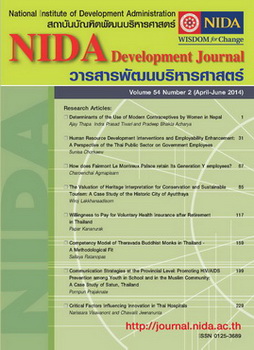Willingness to Pay for Voluntary Health Insurance after Retirement in Thailand
DOI:
https://doi.org/10.14456/ndj.2014.19Keywords:
Willingness to pay, Discrete Choice Experiment (DCE), Health insurance after retirement, ThailandAbstract
This paper reports the results of a study that used the discrete choice experiment (DCE) method to estimate the willingness to pay for health insurance after retirement for workers under Social Health Insurance (SHI) in Thailand. The concept of willingness to pay was needed to evaluate whether healthcare insurance benefits are worthwhile. The stated preference (SP) method, that is Discrete Choice Experiments (DCEs), were then employed in order to elicit consumer preferences and to estimate the value of services based on the individual’s willingness to pay (WTP). In the DCE questionnaire, the respondents were asked to choose their preferred scenario between status quo (using free healthcare services for the elderly, which has free but limited coverage of outpatient healthcare expenses and inpatient healthcare can be used in public hospitals covering only a non-private room and accommodations) and an alternative scenario (with hypothetical health insurance after retirement, including inpatient, outpatient, long-term care expenses and work compensation) that varied along several attributes, one of which was the price of the alternative. The study found that the workers under the SHI scheme were willing to pay for inpatient (IPD) and outpatient (OPD) health service expenses more than other healthcare benefits.
Therefore, health insurance after retirement is proposed. The proposed health insurance after retirement will be organized by government authorities (Social Security Office) but provided by private issuers. The premium of health insurance is minimum at 1,000 Baht per month and maximum at 3,000 Baht per month depending on the policy the person selects.




